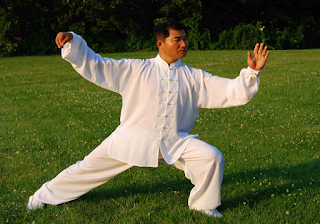Last summer, I practiced tai chi with my mother of 83 years at senior center near his home. The
one-hour class helped me understand why this flow, the practice of
meditation is ideal for older people with health problems exercising. My mother is doing well, but she had osteoporosis and heart valve replacement a few years ago.
Practiced
for centuries in China, tai chi has become popular in the United States
in recent years, thanks in part to growing evidence of its many health
benefits. Not only tai chi to improve balance and flexibility, can prevent falls, relieve pain and even help your heart.
Such as walking, which can be slow or aggressive, tai chi is easily adaptable. You can make smooth movements sitting on a chair or standing. You can repeat movement sequences to gradually strengthen muscles. Such as yoga, tai chi stretch the joints and connective tissue. But you do not get on the floor - a blessing for people with disabilities. And like yoga and meditation, tai chi also promotes deep, slow breathing.
As
I wrote in the Harvard Heart Letter September, hundreds of studies
dating back to the 1950s suggest that tai chi provides modest benefits
for treatment of hypertension and other heart conditions. The
latest research, published online in the British Journal of Sports
Medicine last week, suggests that doing tai chi can help older people
with common health problems, long-term movement easier and improve their
quality of life .
The researchers analyzed data from 33 studies involving nearly 1,600 adults. Most
were in their 60s or 70s and they all had one or more chronic diseases:
arthritis, breast cancer, heart failure or chronic obstructive
pulmonary disease (COPD), a serious lung disease which includes
bronchitis chronic emphysema.
They
all randomized controlled trials: people who did tai chi compared with
those who did so is other exercise or were waiting to join a Tai Chi
class. In
general, people who did tai chi showed greater improvement in the
six-minute test of muscle strength walk (measured by bending and
stretching the knee), and quality of life. People
with osteoarthritis are not harvested both in terms of resistance and
those with other conditions, but the rigidity of pain and improvement. And people with COPD who did tai chi observed less dyspnea.
The
quality of life improvements can come from meditative aspects, mind
calming Tai Chi, says Peter Wayne, assistant professor of medicine at
Harvard Medical School and author of the Guide to Harvard Medical School
in Tai Chi. "Tai
chi incorporates physical activity, breathing, and a variety of
cognitive skills, including images and visualization," Wayne said.
In fact, this is what I find most useful on tai chi, which is often called "meditation in motion". During
a class, the teacher guides you through a series of postures in slow
motion with suggestive descriptions like "grasp sparrow's tail" and
"shake hands like clouds." Instead
of scrolling my mental list of tasks (such as I am prone to regular
meditation classes), I could stay focused and relaxed. I also noticed a sense of camaraderie between the people in the class of my mother. That's another reason I'm doing tai chi classes tends to improve the quality of life of people, Wayne said.
The best way to deal tai chi is to take a class at a senior center or community, health club, or people of the hospital. Of the 58 academic health centers in the United States that have comprehensive health programs, many classes of tai chi offers. Tai chi is also incorporated in many cardiac rehabilitation programs, including several members of Harvard teaching hospitals. And many assisted living facilities offer free Tai Chi classes for its residents.
The courses usually cost around $ 15 to wear loose clothing and supportive, comfortable shoes, such as sneakers. Or you can go barefoot if you prefer. If you can not find a class that is convenient for you, you can buy a DVD, or search online video.
By: Julie Corliss
10/05/2015
Home »
Healthy living
,
Healthy men
,
Healthy tips
,
Healthy women.
,
Mental health
,
Teen Health
» Tai Chi can improve the lives of people with chronic diseases













0 komentar:
Post a Comment
"Thank you for visiting my blog, please leave a comment in the space provided."